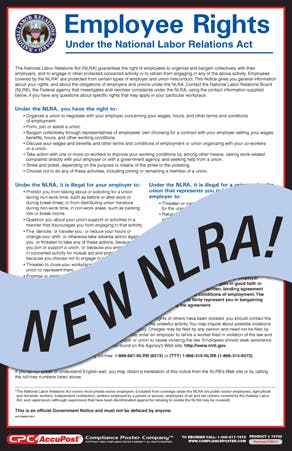Employment laws can be confusing and downright scary.
They don’t have to be. As a public service, from now until my special Halloween webinar Answers to the World’s Scariest Employment Law Questions, I’ll be tackling each major law one by one to give you what you REALLY need to know. By the end, you’ll have handy one-page cheat sheets for each and every law and your terror level will be reduced to zero.
Today’s Topic: the NLRA, the National Labor Relations Act.
Here is basically everything you need to know about the National Labor Relations Act (NLRA) in one handy post.
NLRA CHEAT SHEET
What does it do?
Regulates the relationship between labor and management and provides employees with the following rights:
- To form and join unions;
- Assist unions;
- Engage in collective bargaining.
Who’s covered?
The majority of private employers.
What does it prohibit an employer from doing?
- Interfering with an employee’s exercise of NLRA rights, including making threats of adverse action or bribing with benefits.
- Discriminating against an employee because he or she exercised their rights.
What rights does it provide to an employer?
- Can prohibit solicitation during working time;
- Can prohibit leafleting at the workplace;
- Can prohibit non-employees from coming onto workplace property during the work day.
Note: Any such policies must be uniformly enforced without regard to whether or not they are union-related.
What is a “collective bargaining agreement?”
An agreement between an employer and a union regarding the terms and conditions of the employees’ work and employment benefits.
What are some of the mandatory subjects of a CBA?
- Hours;
- Rate of pay;
- Health insurance and retirement benefits;
- Seniority;
- Assignments;
- Time off;
- Rules of promotion;
- Discipline.
How is a CBA enforced?
Through a grievance and arbitration process in which the union and employer first try to resolve any complaint in collective negotiations. If those negotiations fail, the complaint will go in front of a neutral arbitrator.
What are the potential penalties?
- Reinstatement;
- Back wages;
- Monetary fines;
- Injunctive relief;
- Attorneys’ fees.
Top NLRA tips
- Must bargain in good faith.
- Once a CBA is executed, the employer cannot unilaterally change terms and conditions of employment.
- If dealing with unionized employees, employer can bargain only with the union.
- Employment of employees pursuant to a CBA limits the employment-at-will doctrine; in general, employers can terminate unionized employees only for just cause.
Stay tuned for more. Tomorrow we’ll de-scare-ify the Occupational Safety and Health Act (OSHA).
This was originally published on Manpower Group’s Employment Blawg.
